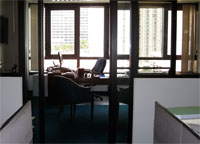Castelló's account

Castelló's office
As Castelló remembers September 7, he returned from lunch at 2:30 p.m. to find Editors Garcia and Marquez in his waiting room. He invited them into his office, but they waited for Corral to arrive, then asked to speak with Castelló "privately, in your office. Then I felt something strange, something weird," recalls Castelló. [5] The Nuevo Herald editor prided himself on an open-door policy, and was angry when the visitors closed the door to his office. At the same time, he says, Corral "turned on a tape recorder, and they go, we have to tell you something: that we are working on a story and we want your reaction.'"
Castelló protested first at the closed doors, then at the tape recorder. "Hey guys, are you crazy? You cannot talk to me that way What's happening here?" he asked. When he understood what they wanted, he asked them to leave. "I will talk to the publisher but the way that you are conducting this investigation is not the proper way. And you are being disrespectful to me," he added. He insisted that he had not known the Nuevo Herald reporters were being paid for their work at Radio Martí.
Listen to
Castelló
on the interview.
Castelló tried immediately to call Publisher Díaz, who was out of town, but could not reach him for two hours. When the two finally spoke, Díaz confirmed that he knew about the Miami Herald story, which further dismayed Castelló. "It was unbelievable that the publisher didn't inform me," he says. Díaz suggested a conference call with Elissa Vanaver, vice president for human resources, and Robert Beatty, the company lawyer.
The conference call convened about 5 p.m., and Díaz announced that he intended to fire the three Nuevo Herald reporters named in the story. [6] Castelló protested: "Jesús, we have to investigate this first We should separate them [put on leave], interview them, investigate them, and not publish this story today." Beatty agreed. Díaz, however, countered that the Miami Herald could not delay publication. "No one could change his mind. No, they are out. And the story runs today,'" recalls Castelló. Under protest, Castelló agreed to fire the reporters.
DeFede redux? Once in the hallway, Castellówho considered Díaz a friend' called him back on his cellphone. Castelló worried that Díaz was making a mistake, as Castelló felt he had in endorsing the dismissal of a Miami Herald columnist a year earlier. In that incident, on July 27, 2005, former County Commissioner Arthur Teele had walked into the lobby of the Miami Herald , dropped off a stack of papers, pulled out a gun and shot himself. After the suicide, columnist Jim DeFede came forward with the tape recording of a conversation he had had with Teele only hours before. He thought it could be helpful to investigators. But taping without the subject's permission, which DeFede had done, was against Herald policy as well as Florida law. Díaz had become publisher only 11 days earlier, on July 16. Fiedler conferred with Díaz and, the next day, fired DeFede. Many in the newsroom disagreed heatedly with the decision; some 200 current and former staff in vain signed a petition to reinstate him.
But when Castelló reached him, Díaz was adamant, saying "if the story's being published, we cannot have those guys in-house," recalls Castelló. So towards 6 p.m. Castelló, with HR Vice President Vanaver present, in turn told Alfonso and Cancio they were fired. Connor was informed that her freelance arrangement with the paper was terminated. The reporters insisted that they had permission from the previous editor, Castañeda. That made no difference to the decision.
During a second conference call that evening with Díaz, Beatty and Vanaver, Castelló made one last plea, to no avail. Castelló could not understand why, if the reporters had permission, they should be fired. Nor did he object to their work for Radio/TV Martí. "Probably if they had asked me for permission, I would have said yes," comments Castelló.
Why? Because we didn't see that as a way to create propaganda, number one. And not one of them was doing propaganda If there is a [US government] policy that you have to be paid for [appearances], that is not a problem.
Castelló was particularly disturbed that TMH editors had given his reporters virtually no advance notice about the story. If the editors, he says, "think that its sister publication is involved in or practicing something that they consider is not the best, why don't they tell us? Why not talk to the editor? Why not talk to the publisher? We consider that is not proper conduct. Behind that, there is always witch hunting and racism."